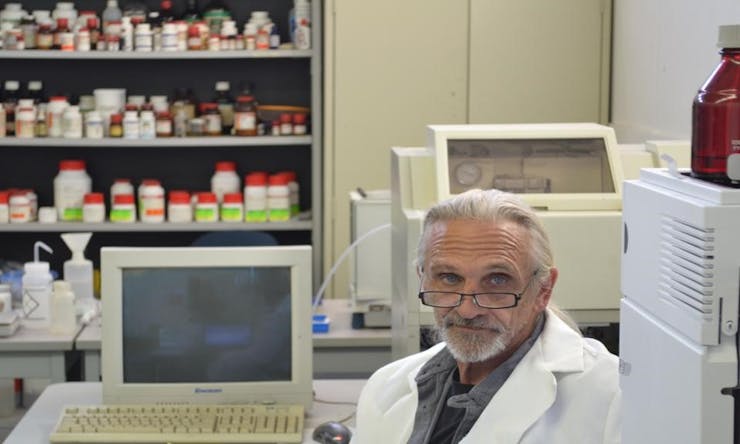In September, doctors and researchers of cannabinoid medicine finally had a chance to show off the results of countless hours of research and many late nights in the laboratory. This year marked the 7th annual Conference on Cannabinoids and Medicine hosted by the International Association of Cannabinoid Medicines.
A total of 164 scientists from all over the world met in Cologne, Germany to spend two days presenting findings from studies about everything cannabis. The presentation topics ranged from cannabis and mental health, to cannabidiol (CBD) binding, to cannabis and tumor reduction.
One such presenter was Dr. Paul Hornby, a cannabis researcher from Vancouver, British Columbia. The Leafly team sponsored his trip to the conference.
A slightly mischievous scientist, Hornby is a lover of the facts. “I spent an evening with Dr. William Courtney (at the conference), the juicing guy,” Hornby begins with a small chuckle. “I told him that there are no cannabinoids in the juice. It’s all in the pulp.”* Fortunately, this wasn’t news to Dr. Courtney, who now advocates blending raw cannabis leaves so the cannabinoid rich pulp is ingested.
Hornby’s innocent jest draws attention to the importance of the conference as a space for knowledge exchange. “Cannabis medicine is so big,” Hornby argues, “We’ve only really just begun to scratch the surface on the power of the plant.”
At the conference, Hornby presented a feasibility study on cannabis as a possible treatment for methadone addition conducted by himself and Eden Medicinal Society (EMS) Research Coordinator Adolfo Gonzalez. A feasibility study is a small-scale experiment which predicts whether or not a future, larger study would be worthwhile.
In this pilot study, forward-thinking EMS, a Vancouver cannabis dispensary, partnered with Hornby to administer 280 mg of THC in capsule form to 11 patients undergoing methadone treatment. Methadone, according to the study, is responsible for one third of prescription overdose deaths in America. This trial took place over three months, and by the end some patients managed to cut their methadone intake by up to 50%.
Participants in the study also reported improvements in their ability to sleep, decreased constipation, and decreased pain. All of these symptoms were associated with both regular methadone use and methadone withdrawal.
Gonzalez, a budding sociologist who has spent time working on needle exchange programs and other community health projects, was able to draw larger, interdisciplinary connections from their study. In their report, Gonzalez suggests that the quality of care patients received and the level of success they experienced over the course of the trial were correlated. He noticed that the patients who were most able to decrease their methadone intake were also the ones who developed a close relationship with dispensary staff, who acted as research assistants during the trial.
“We approached this study from the perspective of natural medicine,” Gonzalez explains. “In cannabis medicine, it’s not just about chemicals. It’s about gaining personal insight, it’s about listening to people, it’s about how they perceive their reactions to the medicine.”
Both Gonzalez and Hornby hope that their work will be picked up by larger research institutions, which would have the resources to conduct a more comprehensive clinical study. “Amongst the academic community,” Gonzalez tells us, “it’s a well-known fact that cannabis is actually quite harmless and, medically speaking, very beneficial. The big opposition is coming from conservative political sectors. In the grand scheme of things, our study is really just a grain of sand in many, many studies that are currently being conducted in Canada.”
These studies, however, are not being acknowledged by government or general population. “Academics are on this,” Gonzalez says. “They’re yelling it from the top of the tallest mountain.”
Maybe it’s about time we make an effort to listen.
*Hornby was also quick to mention that even without the cannabinoids, fresh cannabis juice still has a very high nutrient content, making it a great health supplement.





